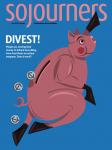NUCLEAR WEAPONS are unacceptable weapons. By design, they aim to cause large-scale and long-term damage not only to enemy troops but to civilians as well.
Humanity has successfully banned and eliminated less devastating weapons, but curiously we have come to live with the idea that some countries are entitled to keep nuclear weapons. Worse, we have come to accept that their production is nothing to be ashamed of and that investing in these companies is sound financial practice.
Investing in genocide is inexcusable, and it is time we tell our banks, pension funds, and insurance companies to stop financing the bomb.
To that end, the Dutch peace organization PAX, for which I’m a senior researcher, produces an annual report called Don’t Bank on the Bomb, providing a detailed overview of financial institutions that invest in companies building nuclear weapons. But the report does more: It highlights positive examples of financial institutions actively divesting from nuclear weapons producers, showing that divestment is not only a feasible strategy but also a socially responsible and ethically sound way to watch over the money of clients. Divesting from nuclear weapons is not rocket science.
Campaigning for divestment helps to curtail and eliminate nuclear weapons in more than one way. First, it helps to further stigmatize nuclear weapons. Most people are unaware that their savings help to finance the bomb, and when this is pointed out to them, most people are uneasy or even appalled by the idea. By providing customers with the facts, we stimulate their readiness to take it up with their banks and pension funds and give them notice to divest from these inhumane weapons. This stigmatization of nuclear weapons is more important than we may think. No weapon has ever been eliminated before it was outlawed. And no weapon is outlawed without first becoming stigmatized.
Second, divestment can have very direct effect. By convincing financial institutions to move their money elsewhere, we can cut off funds for producing companies—make them feel their business is dirty, unwanted. While it is unlikely that divestment by a single financial institution would create sufficient pressure on a company for it to end its involvement in nuclear weapons work, divestment by even a few institutions based on the same ethical objection can have a significant impact on a company’s strategic direction.
Our sister campaign—Stop Explosive Investments—provides a good example. In that campaign, the focus is divestment from cluster munitions producers. Can you imagine a huge company such as Lockheed Martin actually paying attention to such a campaign, or ending their work on weapons? Well, it did, and the corporation said as much in a letter to PAX: “I hope our cessation of the activities in the area of cluster munitions would enable our removal from prohibited investment firms and allow investors to consider Lockheed Martin for inclusion in their portfolios.”
A $1 trillion industry
The nine nuclear-armed states are planning to spend more than $1 trillion over the next decade to maintain and modernize their nuclear weapons. While the majority of that money comes from taxpayers in the nuclear-armed countries, the Don’t Bank on the Bomb report shows that 411 banks, pension funds, and asset managers in 31 countries made $402 billion available between January 2011 and August 2014 to 28 companies that produce, maintain, and modernize nuclear arsenals in France, India, Israel, the United Kingdom, and the United States.
The U.S. is overrepresented here. Roughly two-thirds of all investment in nuclear weapons producers is by U.S. financial institutions. Of the top 10 investors, nine are from the U.S. The top three combined—State Street, Capital Group, and Blackrock—have more than $80 billion invested.
The U.S. is underrepresented when it comes to positive examples. Of the 35 financial institutions we highlight in our latest report for having a policy curtailing or fully excluding involvement in nuclear weapons producers, zero are based in the U.S. It may come as a surprise to U.S. audiences that in several European countries, having a policy prohibiting involvement in nuclear weapons production is actually encouraged. In fact, in countries such as Austria, Denmark, the Netherlands, Norway, Sweden, and Switzerland, banks and pension funds exclude these dirty investments as part of building their image of being a responsible, sensible, and reliable financial service provider.
Over the past years, several countries have started to experiment with regulation or legislation to end involvement in the production of nuclear weapons. New Zealand, Norway, and Switzerland already have national regulations curtailing the involvement of banks in nuclear weapons production, and discussions on similar measures are ongoing in Australia, Austria, Germany, Liechtenstein, and Ireland.
An international treaty prohibiting nuclear weapons will be needed to fully eliminate them. To get to that prohibition, we need to demonstrate support from the whole of society for a world without nuclear weapons.
Don’t Bank on the Bomb aids that process. It allows people to choose better banks, it pushes financial institutions to reconsider their involvement in a potential nuclear Armageddon, and it challenges the acceptability of companies being involved in the production of weapons that are designed to perform crimes against humanity.

Got something to say about what you're reading? We value your feedback!